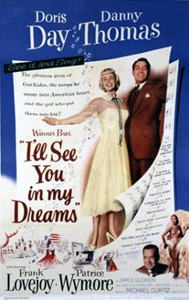Plot
Insecure Gus Kahn wanders into the musical publishing house where Grace LeBoy is a talent judge of some influence. She challenges him to write a love song, but she does not expect him to deliver it to her home the same evening. Grace's parents like Kahn, even after his borrowed necktie dips into his soup bowl. Grace quits her job to plug Kahn's songs on her own. Their first song, "I Wish I Had a Girl," is a hit. But after failed follow-ups, Grace cedes the publicity duties to Fred Thompson.
Kahn embarks on a series of successful collaborations with composer Egbert Van Alstyne. When tenor John McCormack sings their song "Memories" and it becomes a hit, the tongue-tied Kahn finally proposes to Grace. Later, when she is expecting their first child, her pregnancy inspires Kahn and Van Alstyne to rework the Tony Jackson tune "Pretty Baby". After Grace plays Kahn's songs for New York producer Sam Harris, Kahn gains entry into the world of Broadway. Kahn writes a string of successful songs, but his partnership with composer Walter Donaldson, an incorrigible playboy, presents problems. Kahn faces difficulty adjusting to Donaldson's erratic schedule, forcing their eventual breakup. Kahn suffers serious losses in the Wall Street crash of 1929 and experiences a long period of writer's block.
Grace secures a Hollywood contract for Kahn, but he deems it needless charity and travels to California alone. His mental block continues and he suffers a major heart attack. Donaldson seeks Kahn with a promise to be a more reliable partner, and the reteaming leads to renewed success. At a testimonial dinner, Kahn announces that Grace is the "brains" of the family and that he could not have succeeded without her.
Reception
In a contemporary review for The New York Times , critic Bosley Crowther wrote: "Mr. Thomas, who here has his first starring role in a film, lifts it by sheer virtuosity and charm into a cheerful and touching affair. It is hard to say just how he does it. Perhaps it is partly through his eyes, which are bright, appealing and candid; perhaps it is partly through his voice, which has tenderness and sincerity, as well as the lilt of the clown. Most certainly, his talent for wholesome mimicry contributes a lot to the illusion of a lovable character in this film." [6]
This page is based on this
Wikipedia article Text is available under the
CC BY-SA 4.0 license; additional terms may apply.
Images, videos and audio are available under their respective licenses.
